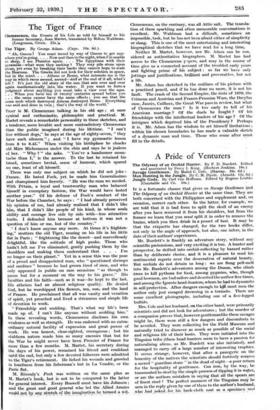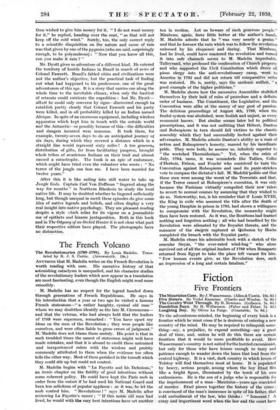A Pride of Venturers
The Odyssey of an Orchid Hunter. By F. D. Burdett. Edited (Constable and Co. 10s.) IT is a fortunate chance that gives us Savage Gentlemen and The Odyssey of an Orchid Hunter at the same time. They are both concerned with the Philippines and supplement and, on occasion, correct each other. In the latter, for example,' we are told that it is bad form to split the skull of an enemy after you have removed it from his shoulders, but from 'the former we learn that you must split it in order to remove the brains, which you then drink in a posset of bard. It may be that the etiquette has changed, for the two books differ, not only in the angle of approach, but also, one infers, in.the date of their authors' experiences. •
Mr. Burdett's is frankly an adventure story, without any scientific pretensions, and very exciting it is too. A hunter and prospector, he drifted into orchid-collecting by hazard rather than by deliberate choice, and it is a pleasure to read his .sentimental regrets over the desecration of natural beauty. .But orchids do not detain us long : we are flung pell-mell into Mr. Burdett's adventures among the Dusun, who climb -trees to kill .pythons for food., among pygmies, who, though good bowmen, are bad sailors and deserted the author five times, and among the Tgorote head-hunters, whom he had to dynamite in self-protection. After dangers enough, to kjhl most men the author only just escaped drowning in a tornado. There are some excellent photographs, including one of a five-legged
buffalo.
Mrs. Cole and her husband, on the other hand, were prinmrily scientists and did not look for adventures ; but the murder of a companion proves that, however gentlemanlike these savages might be, there were still a few dangers and discomforts to be avoided. They were collecting for the Field Museum and naturally tried _to discover as much as possible of the social and religious life of their hosts. They were initiated into the Tinguian tribe (these head-hunters seem to have a passion for naturalising aliens, as Mr. Burdett was also initiated), and managed to carry off a large number of interesting trophies. It seems strange, however, that after a panegyric on the honestry of the natives the scientists should furtively remove a sacred " guardian stone " in the dead of night—a poor return for the hospitality of gentlemen. Can iron, by the way, be transmuted to steel by the simple process of dipping it in water, or are the authors mistaken in saying that all the spears are of finest steel ? The perfect manners of the Tinguian may be seen in the reply given by one of them to the author's husband, „who had asked .for his bark-cloth coat as a specimen and
then wished to give him money for it. " I do not want money for it," he replied, handing over the coat, " as that will not keep off the cold wind." Surely, too, the only correct reply to a scientific disquisition on the nature and cause of rain was that given by one of the pygmies (who dre said, surprisingly enough, to be polyandrous) : " Now that you know all this, can you make it -rain ? "
Mr. Dyott gives us adventure of a different kind. He entered the territory of hostile Indians in Brazil in search of news of Colonel Fawcett. Brazil's fabled cities and civilizations were not the author's objective, but the practical task of finding out what had happened to his predecessor, one of the great adventurers of this age. It is a story that carries one along the whole time to the inevitable climax, when only the hastiest of retreats could extricate the expedition : but Mr. Dyott- albeit he could only converse by signs—discovered enough to establish pretty clearly that Colonel Fawcett and his party were killed, and in all probability killed by an Indian named Aloique. In spite of an enormous equipment, including wireless apparatus which kept him in touch with the outside world and the Antarctic—or possibly because of this—the difficulties and dangers incurred were immense. It took them, for example, twenty-seven days to do an anticipated journey of six days, during which they covered a distance which in a straight line would represent sixty miles I. A too generous distribution of gifts, far from facilitating progress, brought whole tribes of avaricious Indians on their trail and almost caused a catastrophe. The book is an epic of endurance, which might have tried even the volunteer who wrote : " No terror of the jungle can faze me. I have been married for twelve years."
After this it is like sailing into still water to take up Jungle Gods. Captain Carl Von Hoffman " lingered along the way for months " in Northern Rhodesia to study the local native life. It may be doubted whether he lingered sufficiently long, but though unequal in merit these episodes do give some idea of native legends and beliefs, and often display a very real insight into native psychology. They are pleasant reading despite a style which relies for its vigour on a journalistic use of epithets and bizarre juxtaposition. Both in this book and in The Odyssey of an Orchid Hunter it is not clear what part their respective editors have played. The photographs have no distinction:











































 Previous page
Previous page